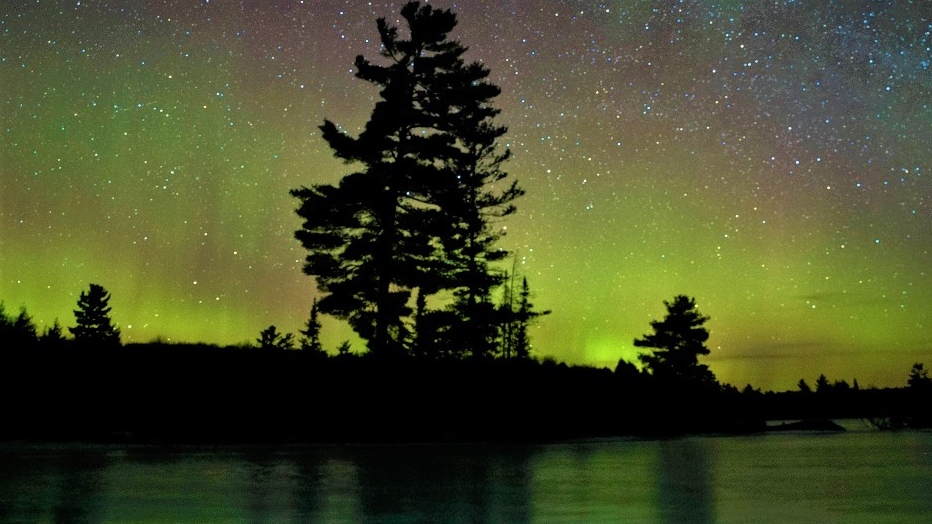Stunning show of northern lights captured across Ontario last night
 The aurora borealis, or northern lights, make a rare appearance over central Ontario north of Hwy 36 in Kawartha Lakes, Ont., on Sunday, March 21, 2021. THE CANADIAN PRESS/Fred Thornhill
The aurora borealis, or northern lights, make a rare appearance over central Ontario north of Hwy 36 in Kawartha Lakes, Ont., on Sunday, March 21, 2021. THE CANADIAN PRESS/Fred Thornhill
Stargazers in Ontario got quite the show as the northern lights illuminated the skies overnight Sunday.
The celestial sightings took place after the U.S. National Weather Service's Space Weather Prediction Center issued a Geomagnetic Storm Warning for Sunday night.
- Download our app to get local alerts on your device
- Get the latest local updates right to your inbox
It wasn’t the only time in recent weeks Ontarians have had the chance to catch a glimpse of the northern lights. On Sept. 18, a geomagnetic solar storm brought the phenomenon to the province.
According to University of Waterloo professor Roan Haggar, sightings like Sunday's could become more common in the coming years.
“The northern lights are affected by the amount of activity in the sun, and the sun's activity goes up and down over about an 11-year cycle. In about 2025 we should reach the next maximum,” Haggar told CTV News Kitchener last week.
In the early hours of Monday morning, over Port Elgin, Ont. and Lake Huron, some viewers were able to capture particularly vibrant photos of the night sky.
One observer on the shores of Lake Superior said the light show was most vibrant after 10 p.m.
One social media user even caught a video of the lights, sharing it to X, formerly Twitter.
Typically, the aurora borealis can only be seen in far-northern latitudes, but on Sunday, sightings were reported in Ontario as far south as London, Ont.
STARGAZING TIPS
Astrophotographer Trevor Jones, of St. Catharines, Ont., says that, for ideal stargazing conditions, you’ll need to eliminate as much light as possible.
Jones has been photographing the night sky for nearly a decade and has captured thousands of shots of southern Ontario's rare Aurora Borealis display.
“The biggest thing you need is clear skies,” Jones said.
“You'll see much more if you're able to get away from the city lights and get somewhere a little darker,” he said.
Jones also recommends giving your eyes some time to adjust to the darkness to best view the night sky and to spot celestial sights beyond the moon.
“If you go straight outside, your eyes aren't going to be ready to see anything, so let your eyes adapt to the darkness for 25 minutes or so,” he said.
Ontario's federal dark-sky preserves include Point Pelee National Park in Essex County, Fathom Five National Marine Park, and Bruce Peninsula National Park near Tobermory, Ont.
Some spots recommended for stargazing, but without official dark-sky designation, include Binbrook Conservation Area in Niagara, Ont., Torrance Barrens in Gravenhurst, Ont., and Lennox and Addington Dark Sky Viewing Area in Napanee, Ont.
CTVNews.ca Top Stories

Donald Trump says he urged Wayne Gretzky to run for prime minister in Christmas visit
U.S. president-elect Donald Trump says he told Canadian hockey legend Wayne Gretzky he should run for prime minister during a Christmas visit but adds that the athlete declined interest in politics.
Historical mysteries solved by science in 2024
This year, scientists were able to pull back the curtain on mysteries surrounding figures across history, both known and unknown, to reveal more about their unique stories.
King Charles III focuses Christmas message on healthcare workers in year marked by royal illnesses
King Charles III used his annual Christmas message Wednesday to hail the selflessness of those who have cared for him and the Princess of Wales this year, after both were diagnosed with cancer.
Mother-daughter duo pursuing university dreams at the same time
For one University of Windsor student, what is typically a chance to gain independence from her parents has become a chance to spend more time with her biggest cheerleader — her mom.
Thousands without power on Christmas as winds, rain continue in B.C. coastal areas
Thousands of people in British Columbia are without power on Christmas Day as ongoing rainfall and strong winds collapse power lines, disrupt travel and toss around holiday decorations.
Ho! Ho! HOLY that's cold! Montreal boogie boarder in Santa suit hits St. Lawrence waters
Montreal body surfer Carlos Hebert-Plante boogie boards all year round, and donned a Santa Claus suit to hit the water on Christmas Day in -14 degree Celsius weather.
Canadian activist accuses Hong Kong of meddling, but is proud of reward for arrest
A Vancouver-based activist is accusing Hong Kong authorities of meddling in Canada’s internal affairs after police in the Chinese territory issued a warrant for his arrest.
New York taxi driver hits 6 pedestrians, 3 taken to hospital, police say
A taxicab hit six pedestrians in midtown Manhattan on Wednesday, police said, with three people — including a 9-year-old boy — transported to hospitals for their injuries.
Azerbaijani airliner crashes in Kazakhstan, killing 38 with 29 survivors, officials say
An Azerbaijani airliner with 67 people onboard crashed Wednesday near the Kazakhstani city of Aktau, killing 38 people and leaving 29 survivors, a Kazakh official said.


































